Digital Payments
Digital technology is transforming the way we respond to emergencies. Innovations range from how we identifying people eligible for assistance, to data collection for assessments and monitoring, to communication with crisis-affected communities. Digital payment systems, including mobile devices, electronic vouchers, and cards – when used appropriately – can deliver timelier, more secure, more cost effective, and inclusive assistance. But as the volume of data we collect, store and share about people grows, we must ensure that our data protection systems keep pace and that we understand and mitigate for the risks inherent in new technologies.
Featured Content

Podcast: Is informed consent possible in humanitarian CVA?
Podcast
Episode 2 of the CashCast tackles data responsibility with Amos Doornbos, Linda Raftree, James Eaton Lee and Ric Tighe

Consent and Ownership in the Shift to Digital Cash and Voucher Assistance
Blog Post
Part of committing to cash and voucher assistance (CVA) is committing to going digital and collecting data. While they are two different things, they are deeply intertwined. And while an organisation can ‘go digital’ without cash programmes, it’s nearly impossible to commit to cash programmes in the long term without going digital. Yes, it is true we’ve done cash and voucher programmes...
Latest
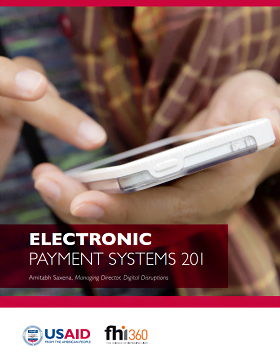
Electronic Payment Systems 201
Guidelines and Tools
Disruptive innovation in the payments sector—and indeed the retail financial services industry—does not occur frequently. This is partly due to the dominant position of the incumbent players (primarily banks and payment networks), and partly due to the nature of the sector itself: as they relate to...
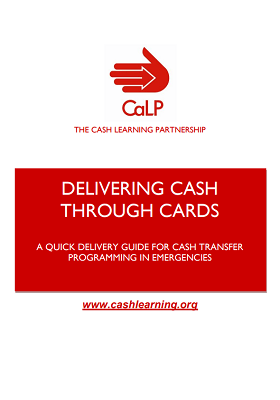
Delivering Cash through Cards: A quick delivery guide for cash transfer programming in emergencies
Guidelines and Tools
A Quick Delivery Guide to delivering money through cards (magnetic stripe or smart cards). Prepared as a practical tool, this guide provides a brief synthesis of the necessary preconditions and advantages and disadvantages of using cheques. It also provides practical implementation tips.
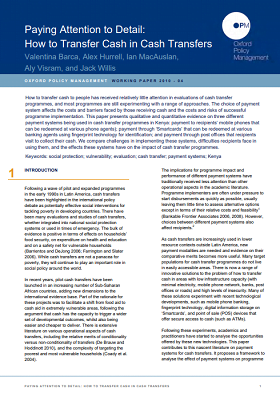
Paying attention to detail: How to transfer cash in cash transfers
Report
This policy working paper looks at various delivery mechanisms which can be used to transfer cash to people in cash interventions. It discusses how these affect the costs, and the barriers, faced by those receiving cash as well as the costs and risks to implementing agencies of successful programme...
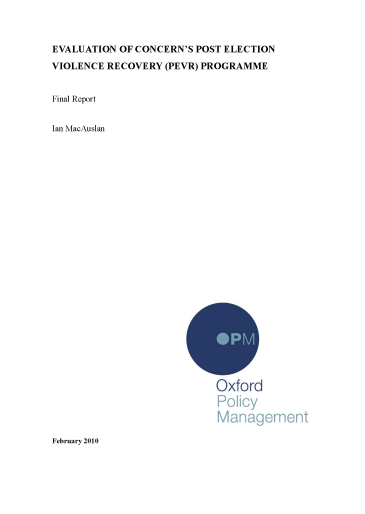
Evaluation of Concern’s Post Election Violence Recovery (PEVR) programme
Case Study
Concern’s Post Election Violence Recovery (PEVR) Programme was a cash transfer programme operating in areas of Kenya (Nairobi, Nyanza, and the Rift Valley) affected particularly badly by the violence that followed the announcement of the national election results in late 2007. Building on several other...

Delivering money: Cash transfer mechanisms in emergencies
Report
This report documents lessons learned in cash transfer programming in emergencies, with a particular focus on the practicalities of how to deliver money to beneficiaries. It provides guidance for project managers needing to make choices about how to efficiently and effectively deliver cash, and explores...
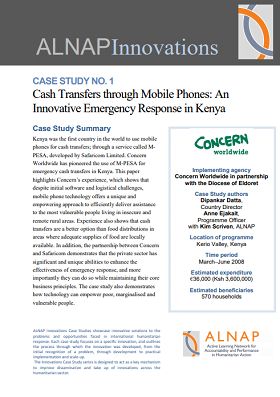
Cash Transfers through Mobile Phones: An Innovative Emergency Response in Kenya
Case Study
Kenya was the first country in the world to use mobile phones for cash transfers; through a service called M-PESA, developed by Safaricom Limited. Concern Worldwide has pioneered the use of M-PESA for
emergency cash transfers in Kenya. This paper highlights Concern’s experience, which shows that despite...

Evaluation of Concern Kenya’s Kerio Valley Cash Transfer Pilot (KVCTP)
Report
The Kerio Valley Cash Transfer Pilot (KVCTP) was Concern and its local partner the Catholic Diocese of Eldoret’s short-term and targeted response to the food security problems that affected communities in four Sub-locations in Baringo North and Pokot East Districts as a result of the post election...

Implementing cash-based interventions: A guideline for aid workers
Guidelines and Tools
This is a comprehensive guide to the theory and practice of cash-based interventions in the field, covering cash grants, vouchers, and labour-based interventions (cash for work). It also includes practical templates including examples of questionnaires, market surveys, beneficiary cards, voucher formats...


